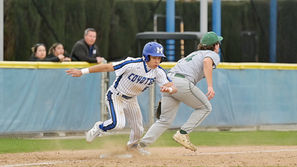Opinion: Pandemic leaves students unprepared
- Sep 3, 2022
- 4 min read
Now that schools have started, educators are realizing how much students have missed, sitting out the pandemic and taking only online classes. Two years ago, writing for Forbes magazine, Nick Morrison wrote, “Children lose up to 40 percent of the gains they have made over the school year while on summer break, according to a new study.” At that time, schools had been shut down only a couple of months in addition to the traditional “summer slide,” and we had no idea that the lockdown would last for two more years.
Washington Post writer Abel J. Koury reports that the “slide” percentage is not uniform. Some children lose less and others lose more. After reviewing several studies, he states, “It was actually children with higher reading or math scores before the start of summer who were more likely to experience a summer slide.”
Cumulative effect
While our public education system has had much success at reducing the nation’s rate of illiteracy, the cumulative effect of summer slide after summer slide has resulted in a high percentage of high-school graduates who enroll in college not meeting college-level standards. Kathryn Boucher, an associate professor of psychology at University of Indianapolis, writing for The Hechinger Report in July, reported, “Before the pandemic, the percentage of students taking at least one remedial course when enrolling in college… ranged from almost 70 percent for students starting at community colleges to almost 40 percent for those starting at four-year schools, numbers that could be even higher now.”
The two areas of knowledge that are tested for entering college students are math and English. Olivia Sanchez, reporting for USA Today, tells the story of Andrea Hernandez, a Dallas student who enrolled at University of Texas at Austin as a math major. She failed the test for calculus, took the summer precalculus course, and is now enrolled in calculus. She told the reporter, “I want to say it’s going good so far but, you know, there’s just some things where I look at them and I’m just like, where’s the math? I just see letters, I don’t understand anything. I’ll just sit there, kind of lost.”
That feeling of being “lost” in college classes is probably far more common among college students than most people realize. And this is especially true for first-generation students whose parents had no more than a secondary education.
Collin Brinkley, an Associated Press reporter, tells a similar story to that of Andrea Hernandez. “Angel Hope looked at the math test and felt lost. He had just graduated near the top of his high school class, winning scholarships from prestigious colleges. But on this test — a University of Wisconsin exam that measures what new students learned in high school — all he could do was guess.”
Because of the pandemic, much of Mr. Hope’s high-school experience was spent online. He said that virtual classes were hard to follow and often he’d just busy himself with something else. “Some days he skipped school to work extra hours at his job. Some days he played games with his brother and sister. Other days he just stayed in bed.”
Forgetting how to be a student
In an April edition of USA Today, Sanchez opines that “after two years of cobbled-together pandemic learning, many college students not only are less prepared than they should be, they’ve forgotten how to be students.”
She interviewed Uri Treisman, a nationally-known mathematician at University of Texas, Austin. He said that, after a 50-year career of teaching calculus, he’s having his most difficult semester. “His students were making basic errors in algebra and trigonometry from the beginning. Despite Treisman doing all he could do to help them succeed, about 25 percent of his students failed…” compared to five percent in a typical year.
With our new emphasis on building students’ self-esteem in deference to teaching them skills, “UT adopted a policy of allowing students to designate up to three of their courses to be graded as pass/fail, rather than with letter grades,” according to the article by Sanchez. Ordinarily, students would have to have passed 30 units of academic work before being allowed to take a pass/fail class. Students with a standard grade as low as D minus receive a “pass” grade, allowing them to move on to the next level underprepared.
Too many students in this milieu are not only ill prepared for the work ahead of them, they are likely to be “lost” in an academic setting. Sanchez points out, “After nearly two years of an altered learning environment, they are having to relearn how to interact in a physical classroom, how to socialize, and how to manage the expectations of being a college student at the same time.”
Ed Venit, an expert on student success at the EAB (Educational Advisory Board) in Virginia, has addressed this massive disruption in our educational system as producing a wave of students with “unfinished K-12 learning.” For entering college freshmen, the baseline of what is “average” has been lowered, and the magnitude of that change may not yet be understood.
Hundreds of thousands of students will be enrolling in college over the next couple of years. Those enrolling this year were sophomores when the pandemic started. Half of their high-school education was composed of online classes. And what they missed out on, aside from the basics of a given subject, was the breadth of knowledge that is gained in a classroom.
• • •
Jim Glynn is Professor Emeritus of Sociology. He may be contacted at j_glynn@att.net.





















Comments